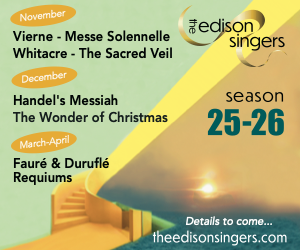As editor of this magazine I have spent a significant portion of the last 18 years attempting to see to it that we have the resources at hand for some 3,600 to 5,000 concert listings a year to be harvested, sorted alphanumerically, arranged in such a fashion that they can be readily found by whomever is looking for them, and judiciously divided up as fodder for a dozen or so writers, so that the magazine is not riddled with repetition.
You’d think that under those circumstances filing and sorting would have become second nature after a while and even, after a fashion, a source of pleasure. Well, maybe for some, but not, alas, for me. Simple decisions about where things are supposed to go can throw me into a state of crisis for longer than you would believe — longer, for example, than it takes Tristan (or any of Wagner’s other moral-fine-motor-skill-deficient heroes for that matter) to explain to the love of his life that he’s promised her to a buddy and, even though he’s really broken up about it, a promise to another guy is a promise that has to be kept.
World domination? Take the table of contents on the previous page, for example. Does my little piece on page 15 about our Conversations at The WholeNote video series really constitute a “feature”? And why is Ian Alexander’s “West Coast Report” on page 30 listed under the heading Beat by Beat when we have no plan in place (yet) to make it a regular column?
In less time than it takes me to agonize through things like this, Brünnhilde could have written a whole “tips for rookie travellers” guide for Siegfried, alerting him to the dangers of letting strangers pour your drinks.
As for calling Alexander’s “West Coast Report” a beat column, call it an exercise in wishful filing, if you like. After all there should be a way for the kind of gleaning and broadcasting of musical listings that we do to take root and flourish, coast to coast to coast, especially in this age of digital media.
So here’s to the ceremonial planting of The WholeNote’s “first spike” on Vancouver Island! The task of marshalling an army of coast to coast WholeNote beat correspondents is under way! Can world domination be far behind? (But don’t tell Mr. Alexander the grand scheme. I don’t want to scare him off.)
Agent Orange? It’s not just in the area of live concert listings that this addled and aging editor finds himself dreaming of spreading the good word far and wide. The Orange Pages in this issue, commencing on page 59, is our first full-blown attempt to come up with a forum for schools and teachers, summer camps and programs to get the word out about who they are and what they offer. Taken along with Rebecca Chua’s piece about her inspirational visit to the Sistema Toronto program, page 56, the death of the music we follow seems less than the sure thing it is so often predicted to be.
Hats off to musical nation building I say! Sea to shining sea. Class by class and beat by beat. Category by category!
Awards: The subject of categories brings us by what James Joyce called a “commodius vicus of recirculation” to the topic of award shows, something more than usually on the collective radar at this time of year.
Nominees have been announced for the April 21 annual JUNOs, this year coming from the Brandt Centre in Regina, Saskatchewan. As usual The WholeNote’s DISCoveries team has done itself proud. Of the 20 nominated albums in the four classical categories the JUNOs offer, The WholeNote had already reviewed 17 prior to the announcement of the nominees. A proud record, that one! In the three jazz categories, we reviewed nine of 15, also no mean feat. As is our custom, we will post on our website a full list of nominees in these seven categories, along with handy links to our reviews.
And still on the topic of awards, a tip of the hat to Toronto’s Mychael Danna, featured in last month’s issue of The WholeNote. Danna, as most of you will be aware, took the Oscar for his score for Ang Lee’s Life of Pi. I expect that many who saw the film and stayed through the credits were awed by the sheer number of people involved in bringing it to the screen. (I think the number 14,000 was mentioned in the credits themselves.) It would be interesting to figure out how that compares, for example, to the number of people it takes to put on all the concerts listed in a single issue of this magazine. Or to the number of people singing regularly in choirs across this land. A fair bit of sorting and filing that would take. I’d better get started.
But before I do, one last award-related note, this time in connection with the Glenn Gould Foundation’s announcement, February 21, that the tenth winner of the prestigious prize is none other than Quebec’s Robert Lepage.
It’s a boldly interesting path that the GGF is on. The awarding of the ninth prize to Leonard Cohen last time out signalled an increase in the frequency of the prize and also a significant broadening of eligibility criteria for prize winners, from a fairly narrow classical base (Oscar Peterson being the one previous exception) to a less category-driven view of music’s place in “the arts.” The leap from Cohen’s Montreal to Lepage’s Quebec City might not be significant in terms of miles. But as an affirmation of the GGF’s intention to cast off the chains of rigid categorization in deciding whom to honour, there could be no more worthy honoree than the risk-taking, genre-defying Lepage.
Each GGF prize winner also selects a “protégé” to receive an award. Cohen’s was none other than the Sistema Toronto project mentioned earlier in this opener. It will be fascinating, as events unfold, to see who Lepage selects. After all, from small beginnings ... sea to shining sea.
—David Perlman, publisher@thewholenote.com




